- Find a Provider
-
Services
-
Redeemer Health provides compassionate care across every stage of life.
- View all Services
-
- Patients & Visitors
- Locations
- Careers
categories:
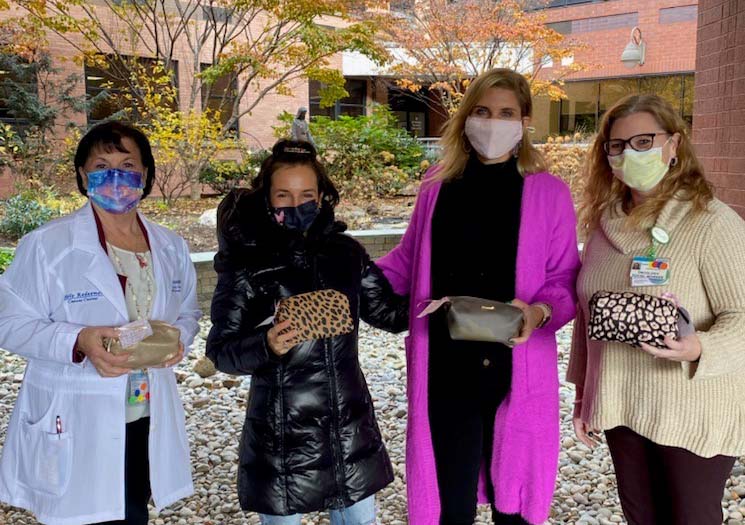
Cancer met its match – Abby Match, that is. After being diagnosed with triple-negative breast cancer at 35, Abby faced cancer with a positive attitude to beat it after eight rounds of chemotherapy, surgery and radiation at Redeemer Health in partnership with MD Anderson Cancer Center at Cooper.
Now a thriver, Abby is part of Living Beyond Breast Cancer’s (LBBC) Young Advocate Program. LBBC is a national nonprofit organization seeking to create a world that provides trusted information and community support and resources to breast cancer patients. As a Young Advocate, Abby helps women diagnosed with breast cancer before the age of 45 understand the disease, provides peer support, and directs peers to much-needed services. Additionally, she connects others to LBBC through grassroots outreach within her community and helps raise awareness to make a difference.
Abby joined forces with LBBC and Stella & Dot – a boutique-style accessories company offering flexible entrepreneurship for women – to generously donate nearly 150 “pouf” gift bags for Redeemer Health in partnership with MD Anderson at Cooper breast cancer patients. The Stella & Dot gift bags include items such as bandannas, Kind bars, socks, teas, and an information card directing patients to peer support programs and helpline resources.
This generous donation surely brought a smile to our patients’ faces as they navigate their way through breast cancer treatment.
“This journey I’m on is not where I saw my life going, but I’m going to make something of it,” says Abby. “I’m going to make pink lemonade out of all the lemons. And that’s the best thing I can take from this experience.”
Redeemer Health’s partnership with Abby, LBBC, and Stella & Dot is one of the many ways Redeemer Health works toward its mission to Care, Comfort, and Heal. For more information about breast cancer services at Redeemer Health in partnership with MD Anderson at Cooper, visit https://www.redeemerhealth.org/breast-cancer.
topics in this article
categories:
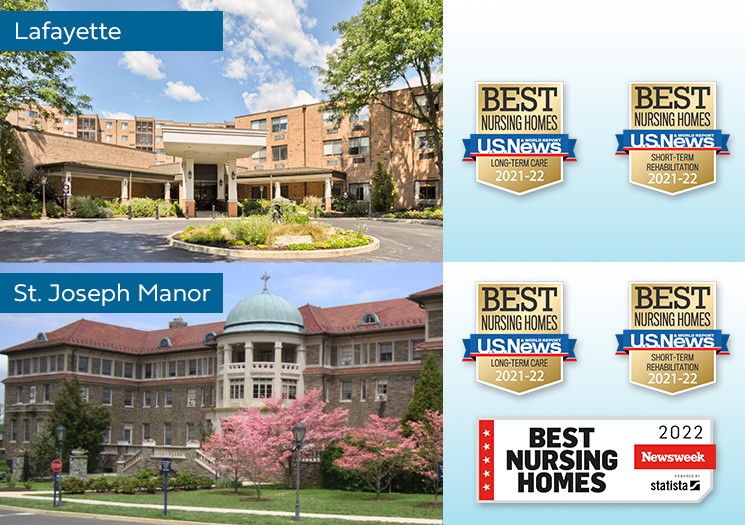
Two Redeemer Life Care communities, Lafayette and St. Joseph Manor, have earned national distinctions for the quality of care they deliver.
US News has awarded a “Best Nursing Home 2022” rating to both communities for the quality of their long-term care and short-stay program. The publication used scientific literature review, discussions with industry experts, and statistical modeling to carefully evaluate 15,298 nursing homes across the country, awarding only 7% of these facilities with a “Best Nursing Home 2022” rating.
“We are proud to have earned a 'Best Nursing Home 2022' rating by US News. This distinction signifies the devotion and dedication that we demonstrate to residents every day. We treat every resident like family and look forward to continuing our legacy of high-quality, compassionate care,” says Joe Munizza, Vice President, Residential Services.
Additionally, St. Joseph Manor has earned Newsweek’s “America’s Best Nursing Homes 2022” rating based on an evaluation done by Statista, a Newsweek partner that looked at performance data drawn from the Centers for Medicare & Medicaid Services (CMS), peer recommendations derived from more than 10,000 medical experts, and metrics around the handling of COVID-19 also drawn from CMS data, as well as other official sources.
Out of 11,849 nursing homes analyzed across the country, Newsweek awarded only 450 with its “Best Nursing Home” rating, with St. Joseph Manor being one of only 26 who earned this distinction in the state of Pennsylvania.
“These distinctions attest to the unwavering focus we maintain to provide high-quality, compassionate care and service. Our staff continued their steadfast dedication to our residents and their health and safety even during the most trying challenges brought on by the COVID-19 pandemic. We are proud to have earned recognition by Newsweek and US News and remain committed to upholding the highest level of quality care,” says Ellie Nocito, Vice President and Administrator, St. Joseph Manor and Redeemer Health Transitional Care Unit.
For more information about Redeemer Health Life Care communities, visit redeemerhealth.org/lifecare.
categories:
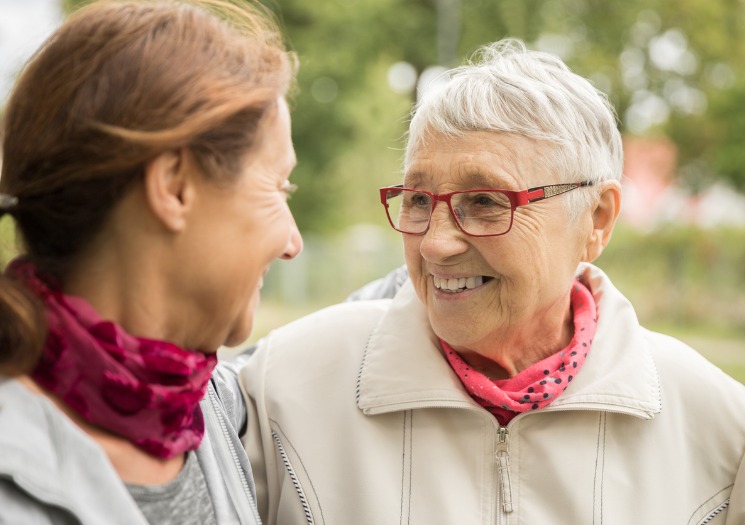
Let’s be honest, the most important talks tend to be the most challenging, especially with an aging loved one. You may tiptoe around the home care conversation because you don’t want to step on their independence. To start a helpful conversation, make sure your loved one feels involved in the process from start to finish.
The benefits of home care services are many. There’s help with everyday activities like preparing meals, bathing and housekeeping. Then there’s medically driven support, like disease management and palliative or hospice care. Your family can build a home care plan that meets your loved one’s specific needs.
Here are five factors to consider when choosing the best home care option for your family:
Identify abnormal patterns in behavior. Keep a watchful eye for subtle changes in behavior. Ask yourself questions like:
- Are they wearing the same clothes each visit? Or disheveled?
- Is housekeeping falling behind? Dishes piling up? Lightbulbs not changed? Trash not taken out?
- Are they eating well? Is the fridge empty or filled with outdated food? Has toast become the meal of choice?
All of these are reasons to consider home care support for safety, companionship and assistance in meeting basic needs. They also indicate medical evaluations could be needed for:
- A change in mental status
- Fatigue
- Joint pain
- Balance issues
- Fear of falling
- Depression
- Failing eyesight
Conduct research. Gather information about your available home care options. Then weigh your options to make the best decision for everyone involved. The sooner your family identifies the ideal option, the better for your aging loved one.
Listen. After you’ve found the best option for your family, listen for areas where your loved one needs extra support. Home care providers can tailor support to your unique situation.
Provide love and support. Reflect on the reasons why you’re taking this important step. Ensuring your loved one’s wellbeing helps them understand you love them and want what’s best for them. Remind them added support at home won’t change your role as a family member. They’re not losing you.
Remind them home care doesn’t take away their independence. It’s important to acknowledge their fear of losing independence. Emphasize that home care services allow them to age in place and maintain their independence.
Start your home care conversation today. Don’t wait for the perfect moment. Finding home care options positions you to make the best decision for your whole family. Getting this support sooner rather than later can lead to a better quality of life for your loved one.
Our team can help you determine whether support at home is right for your family’s situation. Please call us at 215-698-3719 to discuss how we can help.
Redeemer Health provides caring support at home services in Pennsylvania, including Philadelphia, Bucks and Montgomery Counties, and partners with other organizations to provide home support in New Jersey.
categories:
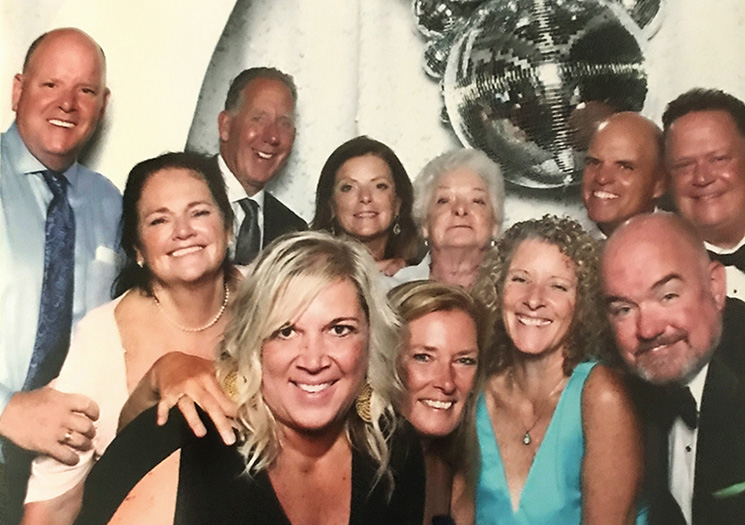
Sister Mary Anne McDonagh, CSR, was a licensed practical nurse who founded the Holy Redeemer Jersey Shore Food Pantry and spent her life caring for poor persons in need.
To her family, she was joyful Aunt Nancy, whose giving spirit inspired them to strive to make a difference in the lives of others through service and philanthropy.
"She was nothing but a bubble of energy and a positive person. Not a negative bone in her body," Bryan Morrissey said of his aunt, who died of cancer in 2012 at age 73.
John Morrissey, Bryan's brother, said their aunt's profound commitment to service instilled in him the sense that service should be part of his own daily life.
"She was always serving somewhere," John said. "She was a woman of the cloth, always visiting the poor, sick, tired, and hungry. She would tell us stories of people she would encounter along the way. She would try to provoke hope in them to help them push forward and be their best self."
In Sister Mary Anne's memory, the family partnered with Redeemer Health to continue the legacy of the Holy Redeemer Golf Klassic, which began in 2002. Proceeds benefit the Food Pantry, which incorporates Redeemer's mission to Care, Comfort and Heal. This year's tournament, the 20th, took place September 10 at the Seaview Hotel and Golf Club in Galloway, NJ.
Sister Mary Anne's legacy also is influencing the next generation of the family.
"She exposed us to everything that she was working on with her fellow Sisters, at the Food Pantry or other projects," said Bryan's son, Kevin Morrissey. "She became a paragon for us to look up to and admire and aspire to and showed us how we can also help others. A lot of us are on various boards and organizations because she taught us how to give and volunteer."
Sister Mary Anne grew up in County Mayo, Ireland. She came to the U.S. at 17 years of age and worked in the rectory and with visually handicapped children at St. Francis de Sales Church in West Philadelphia. In 1958, she entered the Sisters of the Redeemer in Meadowbrook, PA, and professed her vows in 1962, when she was 20.
She felt her calling enabled her to use her personal gifts and talents to meet the needs of the poor and sick, especially in the ministry of home care, beginning with her experience out of the Fifth Street convent in Philadelphia.
"Her mission and demeanor showed that she loved what she did, which cascaded down to the Morrissey side, and she was an influence in our life," Bryan said. "She passed on that you do hard work, get out there and get the job done."
Calling her aunt "charismatic," Trish Spellman said Sister Mary Anne "could pull out of you the desire to be a better person and to contribute to society to help make a difference."
Sister Mary Anne's talents attributed to her eventual leadership roles in the order. She helped to attract young women for the Congregation and worked in the formation of new novices. Though drawn more to "hands on" care than administration, she served as a Sister Board member when requested.
Sister Mary Anne helped open Holy Redeemer Home Care in Swainton, NJ, in the early 1980s. She opened the Food Pantry in 1989, having seen the need in the community while visiting home care patients, who often had little to no food in their cabinets. She expanded the pantry's clientele to include anyone in need. She enlisted help from local churches and individuals. Volunteers started to spring up from Avalon, Cape May Court House, Ocean City, Sea Isle City, and Stone Harbor.
"When she needed anything, people came out of the woodwork to help her in any way," said Mary Francis McGarrity, a niece. "She had a philosophy - 'in giving you receive' - and she always got back three times."
The Redeemer Jersey Shore Food Pantry became a certified member of the Community Food Pantry of Southern Jersey in 1995. It was dedicated to Sister Mary Anne in 2013.
Even when she had cancer, Sister Mary Anne had the drive to keep giving, Mary Francis said, noting her aunt enrolled in trial therapy treatments because she wanted to help others in the future. She ministered to fellow patients in the chemo center by listening to their stories and cheering them up while waiting for her own treatment. "She had a remarkable life," Mary Francis said.
To learn more about the Golf Klassic, go to: Holy Redeemer Golf Klassic.
categories:

Holy Redeemer Hospital has been named an honoree of Excellence in Patient Safety Recognition, a program launched in 2018 by The Hospital and Healthsystem Association of Pennsylvania.
Holy Redeemer Hospital is one of only 17 hospitals in Pennsylvania that have received this distinguished recognition, which HAP awards to top-performing hospitals that have demonstrated low rates of health-care associated infections.
“This recognition by The Hospital and Healthsystem Association of Pennsylvania attests to our continued and focused efforts to prioritize patient safety. Despite the extraordinary challenges of the COVID-19 pandemic throughout the last year, our leadership and team members across all operational areas tirelessly fostered Safe Care principles, which are the tenets of our commitment to high reliability,” says Catherine Egan, Executive Vice President and Chief Administrative Officer, Holy Redeemer Hospital, and Jeanette Teets, Vice President and Chief Quality, Safety, and Reliability Officer, Redeemer Health.
The Excellence in Patient Safety Recognition program analyzes the CDC’s National Healthcare Safety Network to identify hospitals performing better than average. The data measures the following criteria: central line-associated bloodstream infections, catheter-associated urinary tract infections, and clostridium difficile infections. The recognition program also identifies best practices that can be shared among all hospitals.
For more information about Redeemer Health, visit redeemerhealth.org.
categories:

Redeemer Health Food Pantries received over 11,000 pounds of nonperishable food on November 12, as a generous donation from The Church of Jesus Christ of Latter-day Saints. The Church of Jesus Christ of Latter-day Saints delivered the food via an 18-wheeler, which traveled from Salt Lake City.
A vast majority of the food items were grown on Church farms and ranches, and the logistics in production of these goods were predominately coordinated by Church members.
“We are once again this year tremendously thankful for the generosity of The Church of Jesus Christ of Latter-day Saints,” says Joshua M. Jenkins, Vice President, Mission Integration and Pastoral Care at Redeemer Health. “This donation will directly support food pantry operations; something which is at the very core of upholding human dignity and supporting our mission. It is wonderful to have amazing partners in this effort as witnessed by the donation from The Church of Jesus Christ of Latter-day Saints.”
"It is a privilege to support the wonderful efforts of Holy Redeemer Food Pantries. Their work reflects the example of their namesake as they seek to aid and comfort those in need,” says Joel LHeureux, President of the Philadelphia Stake of The Church of Jesus Christ of Latter-day Saints. “When we reach out to others in service and love it blesses both the giver and receiver. We hope that this contribution will aid them in the important and sacred duty we share."
In addition to its extensive range of health care, home care, and life care services, Redeemer Health carries out its mission to care, comfort and heal through community resources including the Redeemer Health Food Pantry of Pennsylvania, located in Philadelphia, and the Redeemer Health Jersey Shore Food Pantry, located in Cape May County, New Jersey. Each month, both facilities support more than 600 families who face food insecurity.
If you are interested in supporting Redeemer Health Food Pantries, please visit www.redeemerhealth.org/giving/ways-give.
categories:
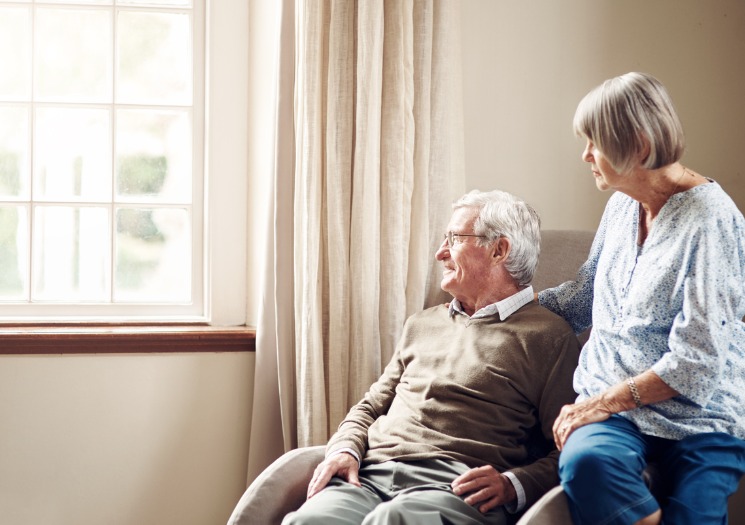
Alzheimer's is a brain disease that causes a slow decline in memory, thinking and reasoning skills. There are 10 warning signs and symptoms. If you notice any of them, don't ignore them.
Most people impacted by Alzheimer’s disease are 65 and older—and according to the National Institute on Aging (NIA), beyond age 65 the number of people with Alzheimer’s disease doubles about every 5 years. Additionally, the NIA estimates about one-third of all people age 85 and older may have Alzheimer's disease.
What kinds of behavior may signal the onset of this disease? We’ve listed 10 common signs that may signal the need for a physician consultation or a discussion on how professional caregivers can help to manage the situation.
1. Memory loss that disrupts daily life
One of the most common signs of Alzheimer’s disease, especially in the early stage, is forgetting recently learned information. Others include forgetting important dates or events, asking for the same information over and over, and increasingly needing to rely on memory aids (e.g., reminder notes or electronic devices) or family members for things a person used to handle on their own.
2. Challenges in planning or solving problems
Some people may experience changes in their ability to develop and follow a plan or work with numbers. They may have trouble following a familiar recipe or keeping track of monthly bills. They may have difficulty concentrating and take much longer to do things than they did before.
3. Difficulty completing familiar tasks at home, at work or at leisure
People with Alzheimer's often find it hard to complete daily tasks. Sometimes, people may have trouble driving to a familiar location, managing a budget at work, or remembering the rules of a favorite game.
4. Confusion with time or place
People with Alzheimer's can lose track of dates, seasons, and the passage of time. They may have trouble understanding something if it is not happening immediately. Sometimes they may forget where they are or how they got there.
5. Trouble understanding visual images and spatial relationships
For some people, having vision problems is a sign of Alzheimer's. They may have difficulty reading, judging distance, and determining color or contrast, which may cause problems with driving.
6. New problems with words in speaking or writing
People with Alzheimer's may have trouble following or joining a conversation. They may stop in the middle of a conversation and have no idea how to continue or they may repeat themselves. They may struggle with vocabulary, have problems finding the right word, or call things by the wrong name (e.g., calling a "watch" a "hand-clock").
7. Misplacing things and losing the ability to retrace steps
A person with Alzheimer's disease may put things in unusual places. They may lose things and be unable to go back over their steps to find them again. Sometimes, they may accuse others of stealing. This may occur more frequently over time.
8. Decreased or poor judgment
People with Alzheimer's may experience changes in judgment or decision-making. For example, they may use poor judgment when dealing with money, giving large amounts to telemarketers. They may pay less attention to grooming or keeping themselves clean.
9. Withdrawal from work or social activities
A person with Alzheimer's may start to remove themselves from hobbies, social activities, work projects or sports. They may have trouble keeping up with a favorite sports team or remembering how to complete a favorite hobby. They also may avoid being social because of the changes they have experienced.
10. Changes in mood and personality
The mood and personalities of people with Alzheimer's can change. They can become confused, suspicious, depressed, fearful, or anxious. They may be easily upset at home, at work, with friends or in places where they are out of their comfort zone.
Help is Here
Do you feel like you may need help to care for a loved one that is exhibiting signs of Alzheimer’s? Redeemer Health can help. Depending on the level of care that is needed, we can support your loved one in their home or in our well-established memory care community.
For skilled care in the home, families can turn to Redeemer Health Home Care. We focus on a person’s overall health, medical history, abilities, lifestyle, goals, and other factors to build customized goals that allow the patient (and their caregivers) to be active participants in their care plan. Our caring and compassionate professional caregivers visit homes throughout Philadelphia and the suburbs, as well as most counties in New Jersey. For more information, visit redeemerhealth.org/homecare or call 1-888-678-8678.
For families that feel a specialized memory care community is a safer option than home care, St. Joseph Manor, a Redeemer Health Life Care community, offers trusted and attentive memory care accommodations. Located in Meadowbrook, PA, next to Holy Redeemer Hospital, the Manor has been recognized for 20121-2022 as a Best Nursing Home by Newsweek and U.S. News. For more information, visit redeemerhealth.org/lifecare/memory-care or call 215-938-4108.
topics in this article
categories:
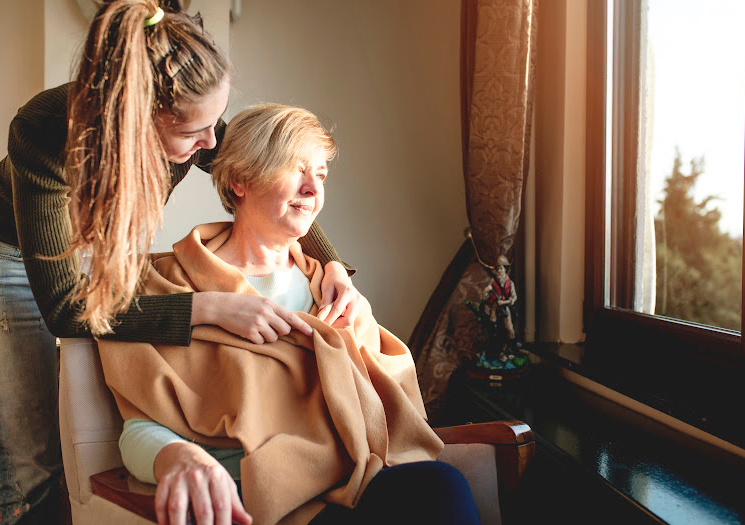
A caregiver is a family member or a friend who helps a person with activities of daily living — personal care, meal prep, medication management, and companionship, among many other things.
Caregiving involves time, energy, and resources. Often, caregivers cope with stressful situations and overwhelming feelings, which can take a toll on their own lives. It is important for caregivers to remember to be mindful of their own needs as they care for others.
There are several simple ways that caregivers can reduce stress:
- Set boundaries - give yourself permission to take time for yourself and schedule uninterrupted time for self-care.
- Take a break - walk away or count to ten, remove yourself from the situation, even if it's for a minute.
- Take a breath - just a few deep breaths or a breathing exercise can calm you down and help you refocus.
- Find your zone - take a moment to fully immerse yourself in a preferred new activity to give your mind a break.
- Exercise - get moving, practice yoga or stretching, go for a walk or a run to relax your body.
- Go outside - connecting with nature, even for a few minutes can rejuvenate your mind.
- Ask for help - you don't have to do it alone, find someone to take some of your responsibilities or give you a break.
- Get support - talking about it helps, share how you feel with your friends and family, join a support group or speak with your clergy leader.
- Get professional help - if you are feeling overwhelmed or want to share your feelings, privately speaking with a behavioral health counselor can help.
- Acknowledge your good work - value what you are doing for your loved one, it is important work.
Understand that stress is a natural part of life, especially when you are caring for a loved one, but taking time to take care of yourself may help you be a better caregiver.
If you would like information about speaking with a counselor visit Redeemer Health's Behavioral Health Services page at redeemerhealth.org/behavioralhealth, or call 215-914-4190.
categories:
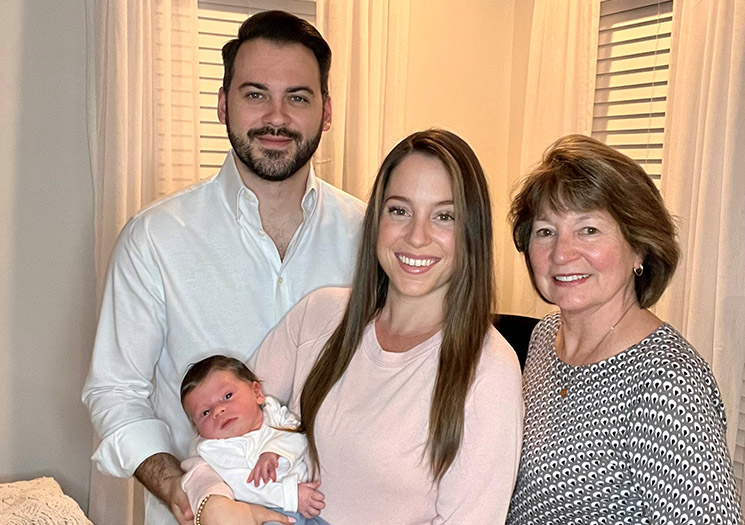
Although it was something she never expected, Nancy Passehl gained a new “family” of support in the form of Redeemer Health’s NICU team when six months into her pregnancy she felt extremely uncomfortable.
The date was October 27, 1989. A terrified Nancy was rushed to Holy Redeemer Hospital, where she learned that she was about to have her baby three months early. Later that day, Nancy’s baby daughter, Jamie, was born at two pounds eight ounces and immediately admitted to the NICU.
Jamie required intensive treatment for almost two months, and much like a lot of premature babies requiring intensive care, she experienced several ups and downs. At one point, her weight dropped to one pound 14 ounces, and for Nancy, this was an indescribable emotional roller coaster.
Although Jamie was in the NICU, Nancy says that “the NICU staff was with me each step of the way. They made me feel very comfortable, and I knew that Jamie was in good hands.”
Thankfully, Jamie and Nancy benefitted from not only the expertise and compassion of the Holy Redeemer Hospital NICU staff, but also from the NICU’s access to advanced medications.
As a result of Jamie’s early arrival, she was born with respiratory distress syndrome, a disease that occurs because the lungs have not produced enough surfactant. Surfactant is a mixture of fat and proteins made in the lungs that coats the alveoli (the air sacs in the lungs where oxygen enters the body), preventing the lungs from sticking together and collapsing. Jamie Marie was given a life-saving drug called Infasurf, a replacement lung surfactant, which was administered through an endotracheal tube.
After nearly two months in the NICU, and growing up healthy and happy, Jamie Di Domizio just became a mother herself! Jamie delivered her son on November 2, 2021, and she now has a healthy Redeemer Baby, Romeo Patrick.
Because of the care she herself received in Holy Redeemer Hospital’s NICU, Jamie, now 32 years old, says, “expectant mothers receive a top-notch level of care, and the maternity staff is bar none. I felt very comfortable delivering a Redeemer Baby at Holy Redeemer Hospital.”
Becoming a mother is one of the most rewarding –and sometimes challenging –experiences a woman can encounter. Redeemer Health is honored to be such an important partner in the lives of Nancy, Jamie, and her son.
As with Nancy and Jamie, our caring and compassionate Redeemer family often has the distinct honor to nurture the health and well-being of generations of parents and children. We want to hear your story! Share with us how Redeemer Health has provided care and comfort to you and your family over the years.
categories:

There are many overall health benefits to quitting smoking - improving your circulation, decreasing your risk of disease, and lengthening your life expectancy, to name a few. It’s never too late to quit and the sooner you do, the more you can reduce your risk of getting cancer and other diseases.
If you are ready to quit smoking for good, here are some tips to help:
1. Stay clear of triggers: your urge for a smoke may be most intense when you are in a place where you often smoke. Avoid relapse by being aware of triggers and having a plan in place to replace the habit, such as holding a pen or popping a mint.
2. Procrastinate: when you have a craving, train yourself to wait at least 10 minutes and distract yourself by playing with a rubber band or stress ball.
3. Confront yourself: in the moments of a strong urge to smoke, you may tell yourself that one cigarette won't hurt. Stand strong and firm. Look at yourself in the mirror and encourage healthy habits.
4. Chew on something healthy: smoking is an oral fixation. Shift the urge to smoke by chewing on something healthy: raw carrots or celery, sunflower seeds, granola, or gum.
5. Exercise the craving away: walking, jogging, biking, or cleaning can help you beat your tobacco craving. Physical activity is a good distraction while also burning calories.
6. Remind yourself of the benefits: never forget why you are working hard to quit: better health, better psychological state, saving money, and sparing your loved ones from second-hand smoke.
7. Remind yourself of who you are quitting for: face the mirror and say it aloud: "I'm quitting for my..." (family, children, parents, loved ones...).
8. Don't go it alone: Find a partner who also needs to quit and support each other. You may also find an understanding friend or relative who you can contact when your temptation is high. You can also call 800-QUIT-NOW (800-784-8669), a free support line offering one-on-one support.
Remember that every day you resist your tobacco cravings is a step closer to completely quitting and improving your health.
